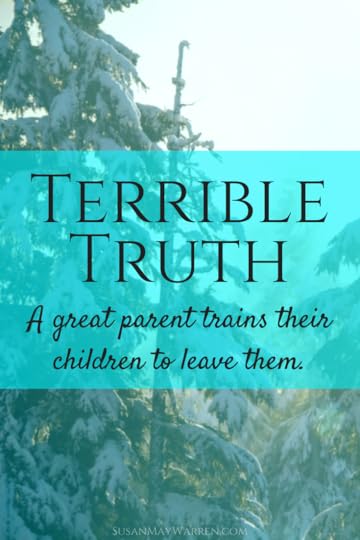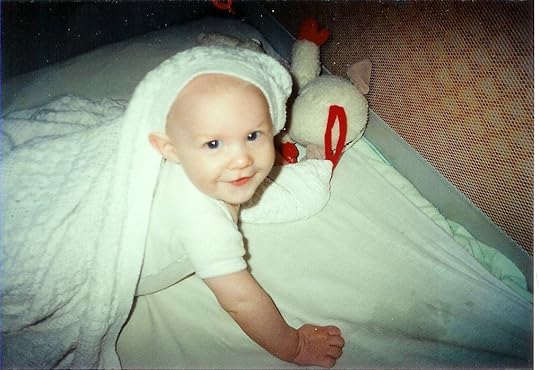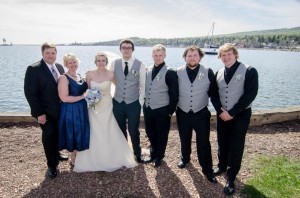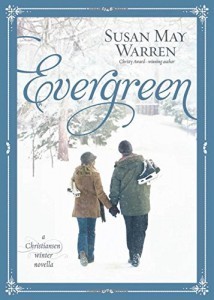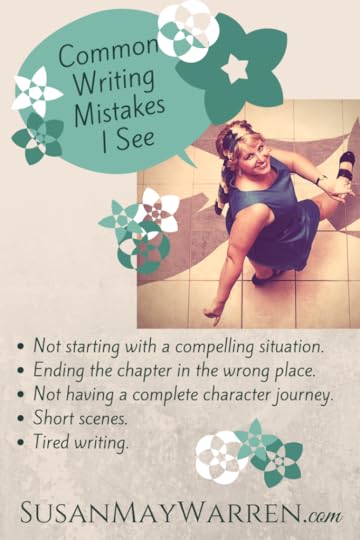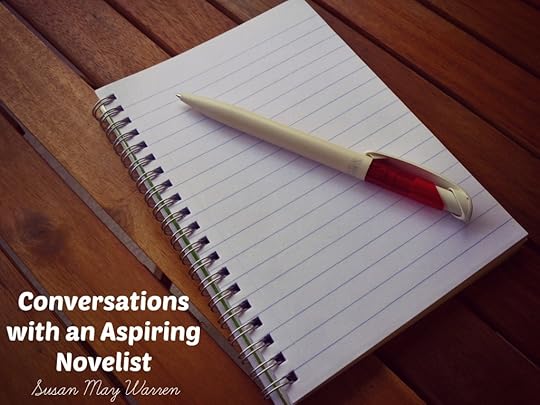Susan May Warren's Blog, page 27
November 4, 2014
Tuesday’s Tasty Treat: Darek’s Chocolate Chip Christmas Cookies

From Ingrid’s Cookbook
My son Darek was about 10 years old when I realized Christmas Cookie baking had the potential to drive me to my last nerve. My children would page through my cookbooks (or magazine’s I’d pick up in the grocery aisle) and beg me to make amazing delectables such as Peppermint Bark, Gingerbread cutouts, or Macadamia Coconut Icebox Cookies. (I have a firm belief if a cookie name is longer than 2 words, it will definitely be too hard to make.)
I admit, I spent one Christmas making every recipe in the Better Homes and Garden’s Cookie Spectacular Seasonal Magazine. Or at least it felt like it. By the end, even the kids were sick of eating cookies.
And then I had a brilliant aha moment.
I’d let each child pick their favorite cookie, and I’d make one batch of each for our Christmas season. We’d save them up and eat them the night we decorated the Christmas Tree, and for Christmas Eve. It worked like a charm. Every child (even Owen, the hard-to-please-son) loved the idea – and proudly claimed his favorite on the plate. These cookies are Darek, my oldest’s, favorite.
By choosing just the best, it allowed me to simplify – and our family to savor the joy of Christmas Season Cookies.
 Darek's Chocolate Chip Christmas Cookies 2014-10-30 16:25:22
Darek's Chocolate Chip Christmas Cookies 2014-10-30 16:25:22  Yields 3 A delicious cookie for the holidays - or any time of the year!
Yields 3 A delicious cookie for the holidays - or any time of the year!
Write a review
Save Recipe Print
Prep Time
10 min
Total Time
40 min
Prep Time
10 min
Total Time
40 min
Ingredients 2 c. white sugar 1 Tbsp Molasses 1/2 c. butter flavored Crisco 1/2 c. margarine 2 beaten eggs 1 tsp vanilla 3 c. flour 3/4 tsp. baking soda 3/4 tsp. salt 1/2 bag chocolate chips 1/2 bag peanut butter chips *If you want to make it fancy, add a bag of holiday M&Ms
Instructions Cream sugars, molasses and vanilla. Add eggs, beat until creamy Add flour, baking soda, salt, mix until creamy pour in chocolate chips (or M&Ms) Stir gently. Bake 350 for 8-10 mins.
By Ingrid Christiansen
Adapted from Evergreen: a Winter Novella
Adapted from Evergreen: a Winter Novella
Susan May Warren http://www.susanmaywarren.com/
Hint: Sometimes I make two batches because my boys have been known to sit at the counter and gobble these as soon as I pull them from the oven, dunking them into a glass of creamy milk!
Simply and Savor Tip: Ask your family to list their favorite cookies, and choose one per family member to delight them during the season.
Thanks for reading,
Ingrid
November 3, 2014
From Ingrid’s Journal: Treasures at Twilight
 It wasn’t so long ago that I was a young mother of four – then six amazing children. The chaos, the runny noses, the scuffed knees, the wrestling on my clean kitchen floor – all fond memories now.
It wasn’t so long ago that I was a young mother of four – then six amazing children. The chaos, the runny noses, the scuffed knees, the wrestling on my clean kitchen floor – all fond memories now.
I’ve always wanted to blog, to asked my author friend, Susie May, if I could take over her blog for the month of November, share my journal entries, life-hacks from running a big household, favorite holiday recipes, insights on how to parent adult children, and even answer a few questions Susie’s reader friends have asked. Give you a glimpse behind the pages of our life up here at Evergreen Resort.
Hopefully you’ll see yourself a bit in my musings, one gal to another trying to make sense of faith, family and real life!
*****
If I can put one touch of rosy sunset into the life of any man or woman, I shall feel that I have worked with God.
George Macdonald
The hamper overflows, toys litter the floor and leftovers harden in the supper dishes. From the bedroom, young voices crescendo into argument and I feel my headache throb. The sun is falling, a brilliant mandarin squeezing its juice onto the horizon and I stop, a toy in my grip, and enjoy His magnificence, a symbol of His love.
A tug on my shirt tears me from worship. Annoyance flickers briefly, but is doused by a tender smile, a book gripped in chubby hands. “Read to me, Mommy.”
I sigh. I have no energy and my headache screams in protest.
“Okay,” I say and pull my toddler to my lap. “Good night, moon. Good night room…” I begin quickly, then slow with the gentle rhythm of the story. Too quickly it is done. My boy’s eyes twinkle. “Again?”
“Okay.” Again we say good night to bears on chairs, mittens and kittens. We are done, and another son climbs aboard. “Read this one, Mommy.”
We read about a steam shovel named Maryann, a little Engine that could, and Horton the Elephant.
The sun is sleeping, my children follow. They kiss me and slide from my lap, laughing, happy. My headache is gone. The shadows of dusk hide the scattered toys. I shut the laundry room door, tightly.
Kisses, hugs, prayers and suddenly the house is quiet.
But my heart sings. In the magic of twilight God has reminded me of the simple treasure of creating, for my children, a memory of love.
The moments matter. They become memories to savor.
What moment have you savored lately? #ThoughtsfromIngrid http://bit.ly/1xGl8u9
Click To Tweet
Simplify and Savor idea: This year, for Christmas, I found a holiday read aloud (I admit, my favorite is Susan May Warren’s The Great Christmas Bowl!) and read it to my children as they did the dishes. One chapter/night. It gave me a break from cleaning up, and kept them entertained!
What moment have you savored lately?
Thanks for reading!
Ingrid Christiansen
November 1, 2014
Simplify and Savor
“Around the same time, a man called John began to travel, preach and ritually wash people through baptism in the wilderness of Judea. John preached a stern but exciting message. Repent! For the kingdom of heaven is near.”
Matthew 3: 1-3, The Voice New Testament.
Our high school football season is over. We went through another winless season – tough on the guys, but character building, of course. My son, Noah, was one of the captains, and he fought to motivate his team every week, turning him even more into the leader, a man built for others.
The season capped off with the annual football banquet, a highlight for the seniors where their coaches talk about each of them individually, encouraging and blessing them as they forward in life.
Noah’s coach, Boom, said of him, “Noah is an old-school football player. He likes to get on the line and do his job. He likes playing hard, giving it all he has, getting dirty and playing his heart out. Simply put, Noah loves the game of football.”
Noah plays lineman, which, if you know your football positions, isn’t a glory spot. It’s a blocking position – getting in the way of the defense (or offense – he played both ways), so that your backs can score. Or, on defense, it’s occasionally making a tackle, but mostly putting pressure on the ball-carrier so your d-backs can make a tackle. (sorry if I lost you there – but hang with me).
In other words, Noah’s job, for each play, is to go nose-to-nose with the other guy and push him back. It’s gritty, tough work and a great lineman makes a way for other players to shine.
He does one thing, but he does it well, and he loves it. In fact, I think he loves it because he’s poured his heart into doing that one thing, well. His heart is not divided into wanting other positions, but rather dedicated to the one he has. And it’s allowed him to savor his final season, even with the losses.
He recently turned down his election to captain of the track team so he can lift weights and prepare to play college football.
Focus. Simplicity. Savoring his favorite sport.
I’ve spent the past year trying to put the brakes on life. With my daughter getting married, Noah getting ready for college and finding myself with a too-quiet house, I’m looking at my life and taking a deep, cleansing breath. What can I focus on? How can I simplify? Is it possible, in doing so, I can find a deeper love for life? Even better – can I find a deeper love for my Savior?
As I was reading Matthew this morning, John the Baptist’s simple message clung to me. Repent! For the kingdom of heaven is near. Get your heart right, so you can recognize and savor the Savior.
November is our John the Baptist month. It’s our opportunity to focus. I look ahead to the holiday season and instead of the bustle, the shiny lights, the miles of to-do lists, and I wonder – how can I simplify so I can savor the advent season?
Maybe I give myself the gift of time to savor Christ longer in the mornings.
Maybe I rethink my schedule so I party less, but spend time with the ones I love more.
Maybe I simplify my menus so I have more time to puzzle with the family.
I’m not sure, but believe there is a gift in doing less.
How can I simplify so I can savor the advent season? #IngridChristiansen http://bit.ly/1tGCOGO
Click To Tweet
Recently, we celebrated a weekend together as a family in Minneapolis. We hadn’t all seen each other since Sarah’s wedding in May, so we savored our time together. We kept it simple – a football game on Saturday afternoon. Take-out and games in Sarah & Neil’s tiny starter apartment. Laughter. Teasing. Joy.
I’m going to do something a little crazy on my blog this month. I’ve invited Ingrid Christiansen, the mother in my Christiansen family series to take over and give us her insights on simplifying and savoring the holiday season. Devotionals from her journal, tune-ups for the heart on savoring the season, secrets to simplifying and surviving the onslaught of the world’s expectations, snapshots of life on the north shore, and scrumptious recipes from her kitchen.
I hope you’ll stop by, see if Ingrid’s words bless you.
And, if you want to read Ingrid’s story, I’d invite you to pick up my Christmas novella, Evergreen, a story about keeping your marriage alive in the “winter” of your lives. (a story lifted from the pages of my own life!) It’s in hardcover – so it would also make a wonderful Christmas gift. J
Let’s Simplify and Savor this season. For the Kingdom of Heaven is near!
Thank you for being my reader friends – I appreciate you!
Susie May
September 25, 2014
Terrible Truth: A Great Parent Trains Their Children to Leave Them.
I have come upon a terrible truth.
A great parent trains their children to leave them.
I’m not sure why this didn’t click with me before. I mean since birth, hello, my kids have been leaving me.
I tried – oh, I tried, to extract promises that they’d live with me forever. In fact, I can pinpoint exactly when each child promised me exactly this.
“Mom, I promise, I’ll never leave you.” This child – this cute adorable child – said that.
And this one asked me if he could live with me forever.
Uh, YES.
Clearly, their promises mean nothing to them.
But I’ve come to this realization slowly. I’m not sure why it took me so long – I’m on number 3 out of the nest, but it came to me sometime last month, after my third child left – gleefully, I might add – for football camp at Bethel University. He didn’t call me for 13 – yes, 13 long, painful, mysterious days. And when he did, he said the words I shouldn’t have dreaded to hear….”I’m just fine, Mom. Sheesh – what did you think, that I’d fall apart without you?”
Uh. well.
Was, “Just a little” too much to hope for?
Apparently he’s FINE. They’re all FINE.
I did my job. I trained them to leave me. To be FINE without me. To not only cope, but succeed and win…without me.
I feel duped.
What did I do wrong? I’ve been pondering this…and I’ve hit on a few of my big mistakes.
Things to do if you never want your children to leave you.
1. Don’t tell them they are GOOD at anything! Seriously – if you attend all their football games and band concerts and musical and theater events, they’re liable to actually believe they are awesome at something, and attempt to spread their wings. And when they do that…they fly away.
2. Don’t let them leave home for big adventures. Like working for numerous summers at a camp, or travel the world with Teen Missions, or even sending them off on short term missions trips with the church youth group. They may start thinking this sort of behavior is normal.
3. Don’t make them earn their own money! With their own paychecks they can do things like buy their own cars. And clothing. And phones! And then, suddenly, they are saying things like, “I’m going to Duluth, Mom…I’ll call you when I get there!” Yeah, sure you will.
4. Don’t stay silent! Don’t just sit and listen when they come home upset, wait out their rant, and let them ask you for advice. ADVICE is good! Give lots of it, whether they want to listen or not. Mistakes will only make them stronger….and suddenly they’ll think that they can LEAVE YOU.
5. In fact, solve all their problems for them. Seriously. If they have to rely on you for everything then they’ll never have the confidence to leave. [Mwhahaha!]
6. Definitely don’t give them responsibility at home, like household chores and expectations, or let them build up your trust by letting out the leash and even make mistake that you let them take the consequences for.
I’m telling you – you do that, and suddenly you’ll have a kid who piles stuff in her car the day after graduation, kisses you goodbye and drives away.
And then you’ll just have a quiet, albeit clean, house. And a dog.
You’ve been warned.
Susie May
PS –If you like stories about faith, family and real life, check out The Christiansen Family Collection!
Are you new here? You might want to follow me on Facebook, Twitter, Pinterest, or Instagram.
September 17, 2014
How Do You Get Started?

Megan H. asked me: “I’ve been thinking about becoming a writer when I finish school, and I was wondering how you got started.”
I think a writer has to be two things from the get-go – a lover of stories, and someone who is committed to working hard. I was the kind of girl when I was young who would pedal her bike to the library and spend the entire day reading. I loved stories and getting lost inside another world. As I turned my sights toward writing, I looked at the kind of books I read, and tried to figure out why they worked, or didn’t work, and my favorite part about them.
Then, I began to write. And this is the hard work part. I wrote and wrote – for myself, for any publication that would print my work; I wrote letters and journals and devotionals and eventually wrote for magazines. I looked for contests, and open doors into publishing, made friends with other writers, who connected me to publishers, (kept writing – now novel size books) and finally found a publisher who was willing to take a chance on me.
Read the kind of books you want to write and learn to dissect them.
- What works and what doesn’t?
- What do you like/dislike about the hero/heroine?
- What is the pacing of the plot?
- How does the author evoke your emotions?
Read CRAFT books – like Donald Maas, and James Frey, and Sol Stein. Apply their exercises to your work.
Join a critique group who will give you honest feedback and help you grow. Also, join an online group like ACFW for support and to increase your industry knowledge.
Go to writer’s conferences. Soak up the information there.
WRITE. And submit, and keep writing.
Trust that God has a plan, and don’t give up.
I really wish I’d started writing novels when I was 22!! But it took me until my middle thirties to figure out that was what I wanted to do…so, go for it, and God bless you on the journey!
Are you new here? You might want to follow me on Facebook, Twitter, Pinterest, or Instagram.
September 11, 2014
Snapshots & Evergreen
Our family is loud. We easily take over a restaurant, the football stands, and even our campfires in our backyard seem to echo into the night. Rambunctious, funny, dramatic…we don’t run out of words.
However, as the kids have grown up, the house has quieted and I have to turn to the snapshots in my memory to keep the voices alive.
Snapshots, like, the day my eldest son took the stage, head shaved, as Daddy Warbucks. The day I realized he’d grown up.
Snapshots, like the sound of my daughter singing the national at our local football games. Or hearing her speak her vows to her groom, 4 years later.
Snapshots – or a movie, really of watching my middle son plow through the defense, the first time he ran for a touchdown. Then the vivid smile on his face the day we told him he was going to meet the Minnesota Vikings.
The sweet, quiet snapshot of the day my youngest son sat down on the sofa, and unbidden, put his arm around me and said, you’re a great mom. Or the crazy moment when he sacked the QB in his first game as a Senior, Captain.
The memories go on, of course, but these snapshots stay in my mind, precious, delicious, moments that fill my head with voices when, as it is now, my house feels so quiet.
So quiet, I can hear my heartbeat, the wind in the pine trees around my house, the resounding echo of the empty nest.
I live in one of the most beautiful places on the planet – in a carved out section of woods in northern Minnesota on a hilltop that overlooks Lake Superior (in the winter – we like to say we have a seasonal lake view.) It’s quiet, only the rush of the wind in the trees. At night, the sky is so dark the stars seem just an arm’s length away. Right now, bejeweled leaves in orange, gold and apple red blanket my dirt driveway, and the air smells of wood smoke and the loamy bouquet of autumn. I wish you could all come and visit.
My favorite part about living here are the sunrise and deep nights viewed from my deck. In the early morning, I take a cup of coffee and watch the morning syrup through the trees, across the cedar planks to kiss my toes. It’s where I have my devotions and it awakens my day to the source of joy.
At night, after the house is quiet, I take my tea (or a glass of wine) outside again and sit in the Adirondack chairs and watch the stars and listen to the wind. I sit there, and I think about the fact that this life is just the beginning. That there is more, and what I do in this life matters for the next. That the choices I make here affect the everlasting. It makes me grateful for amazing grace, and the gift of salvation.
There is more. What I do in this life matters for the next. @susanmaywarren
Click To Tweet
I wrote a Christmas book about quiet that happens when the kids leave. How it stirs up old voices, and maybe old hurts. It’s called Evergreen, and it’s really the story of the next season. The snapshots still to be taken.
I hope you’ll check it out.
And, if you want, share with me (and my readers) the things you’ve done to keep your marriage “Evergreen.”
May your life be loud with the voices of love.
Susie May
Are you new here? You might want to follow me on Facebook, Twitter, Pinterest, or Instagram.
September 10, 2014
Characters Worth Rooting For
You know what’s NOT a great idea? Putting dinosaurs in a Transformer movie. But why, you ask, do dinosaurs show up in a Transformer’s move? Probably because someone was sitting in a meeting, looking at the script and said…”I dunno, something is missing…”
It’s not the dinosaurs. It’s the fact that yes, even on page 98 of the script, we still don’t really care about the main characters.
Now, I know that the entire movie is about the possible annihilation of the human race, and yes, that is something I should probably care about. But it’s all about the CHARACTERS. If they aren’t sympathetic, then don’t bother holding my seat while I run out for popcorn, and maybe slip into a different movie.
So, Step One: Make us CARE about the characters from the first page.
Put your character in an everyday situation we might all find ourselves in. Stuck in traffic with your boss, late for a presentation. Kids fighting in the back seat. The chaos of packing for vacation. Kids running by your blanket at the beach and kicking sand into your book. Whatever. We need to relate to your character through everyday moments.
Give your character and undeserved misfortune. A few of the above examples portray this, but others might be a flat tire. Coffee spilled on their new shirt. A boyfriend breaking up with them. Undeserved misfortune always grabs a piece of our heart.
Make your character quirky – in a cool way. There’s nerdy, there’s OCD, and there’s QUIRKY. Quirky is to accentuate their good, or even sweetly peculiar qualities in a way that makes us like them. Take Doc Brown in Back to the Future. Our first meeting of him is him wearing his crazy goggles. Or Russell, the ardent boy scout in UP, who is so enthusiastic about doing a good deed, he ends up on the adventure with Carl. I used this technique in my PJ Sugar series – dressing PJ in a hotdog costume just about the time she needs to apprehend a bail jumper. What about your character is endearingly quirky? Use that to bond them to the audience.
Add in a Boyscout Moment. You know this moment – it’s the moment your hero proves he’s a great guy, even if we haven’t seen it by doing something nice at the beginning of the story. Gets the neighbor’s paper, opens the door for coworkers, buys coffee for a friend – something small but chivalrous that proves his good heart.
Step Two: Make us root for your character in every scene by making him sympathetic!
Sure, we can start a book with a great character, but sometimes people turn nasty in the middle of stress – which is what your character is under. We’ll forgive him for snapping at the girl, or refusing to help someone if we like him, overall, and realize it’s for a good reason. That means setting up the story right, and then asking, before every scene:
- Does my reader understand why my character is doing this? Is my reader rooting for him?
- You might need to create more sympathy. Take a look at your scene.
- Is your character in a relatable situation?
- Can you give him some undeserved misfortune?
- How about reviving his quirky side?
- Mabye, simply, add in a boyscout moment.
- Most of all, at the beginning of every scene, ask: Does my reader like my character enough to root for his/her success, even if they make a bad decision in this scene?
Instead of watching Transformers 4 (well, you can watch it if you want – there ARE dinosaurs, after all), I encourage you to pick up The Secret Life of Walter Mitty.
Walter Mitty is an unappreciated negative assets manager at Life Magazine who’s always wanted to live a life of adventure. And he does – in his mind. He is immediately sympathetic because although he lives a “boring” life, he often daydreams (and this is the quirky part) of him saving the day. To the point that others have noticed and think he’s weird. Add to that, in the beginning, he has coffee spilled on him, a little undeserved misfortune, and his sister has baked him a pineapple upside down cake for his birthday, which he brings into the office to share.
Lots of likeability.
As the movie plays out, he continues his quirky, misfortunate, boy scout moments, from helping his mother move, adding his profile to an online dating site, travelling to Iceland (or maybe it was Greenland), jumping into shark-infested waters, and the list continues. In the end, it’s because he is so likeable that he saves the day. And, although the adventure is a little unbelievable, despite being exiting (even without dinosaurs!) we stay with him. Because, we wish we were him. Or at least, wish we were his friend.
Make sure we like your character enough to root for him.
Now, Go! Write something Brilliant!
Are you new here? You might want to follow me on Facebook, Twitter, Pinterest, or Instagram.
September 3, 2014
Common Writing Mistakes I See
I thought it might help aspiring writers to see a quick summary of the common mistakes I’m seeing as I look at entries and talk to authors looking to get published. So here they are, in no particular order.
Not starting the story with a compelling situation. So many entries and rough drafts are starting in a place where the author is either explaining the character’s backstory or creating the storyworld instead of getting to the character and creating a situation where we see him interacting with his world, setting up for the inciting incident (or even in the middle or after it). Remember, the first three chapters of your novel are the ‘drive’ chapters, the chapters that propel your reader into the story. You need powerful language and scenes to hook your reader. Most of all, there must be something at STAKE that makes care and want to read more.
Short scenes. At the beginning of a book, it is essential to build that storyworld, characterization and stakes, and it’s nearly impossible to do this with a short scene. We need to get into the story, wade around, see the parts, and get deep enough to be taken by the current (by the way, I know I’m all over the place with my metaphors today, but I’ve been teaching for 3 days straight and that’s just where we’re at today). Aim for at least 1200 words.
Not ending the chapter in a place that makes the reader want to read more. So many scenes are ending with the tension resolved. If you do this, the reader doesn’t’ want to read more! Keep the tension going, or introduce new tension and your reader will go onto chapter 2!
Not having a complete character journey. This means an inner as well as an outer journey (remember, the outer journey is just the catalyst for the inner journey) as well as an inciting incident, black moment and epiphany. Your story has no point without these elements. Also, be aware of motivation and realistic emotions. The motivations for their actions must make sense, and their emotions must be realistic. Don’t give us expected, soap opera emotions – go deeper and really ask how to create an emotion that feels real.
Tired writing. Clichés, passive writing, mundane dialogue and most of all, bad writing. Like mixed metaphors (when in doubt, just don’t use a metaphor!), and terrible emotional content, “His heart banged inside him like a parade of marching band cadets” is NOT good emotional writing. Neither is, “Panic bombarded her like an avalanche of snow.” Please, think through how this emotion really feels, and show it through their actions, dialogue, inner thought and even the setting.
Are you new here? You might want to follow me on Facebook, Twitter, Pinterest, or Instagram.
August 27, 2014
What is Voice and How Do You Find Yours?
Outside, the wind howled, the thermometer dropping to a bracing negative nine degrees as I waited for Sally to arrive for our Monday Morning conversation. I had hoped she’d found a story question as she thought about the themes of her story. Ironically, I’d been thinking about marketing my new book, and had to return to the storyquestion of that book to create the right marketing and PR campaign.
I blew on my hot cocoa, glad I’d opted for a large as Sally came in, wrapped in a scarf and hat, the icy blast dragging in behind her.
Anne already had her coffee ready. Sally set a stack of books on the table as she retrieved her coffee. I looked at her choices – Jane Eyre, the movies Pearl Harbor and Casablanca, and one of my favorites – Redeeming Love. An interesting collection and I searched to find the connection as she sat down and unwound her scarf, her cheeks rosy. “You said you wanted my favorite books.”
“Tell me why you love these,” I said.
“I love Pearl Harbor because of the mix of historical fact and the fact that the story is romantic and personal.”
I nodded. “That’s what makes a story set against an epic backdrop so fascinating – how it affects individuals. James Cameron did it in Titanic too.”
“I want to weave in the details, while still keeping the story focused on the character.” She picked up Redeeming Love. “I love the theme of this one, the unconditional love of God. And the hero is so…heroic.”
“So, you love the characters and the story question – does God love us even when are sins seem unforgiveable.”
“And the way she tells it. No fancy language, just a great story.” She picked up Jane Eyre. “And yet, I love the style of writing. Poetic and rich.”
“And this one?” I held up Casablanca.
“The romantic angst and tragedy. “
“You are a romantic,” I said. “And I’ll bet a fan of Benny Goodman and Mary Jane shoes.”
She grinned.
“I’m going to save my Casablanca discussion next week when I talk about the four things that every book has to have. But for now I want to gather these elements to talk to you about Voice.”
Outside, the wind shook the panes of the windows, a film of ice building along the sash.
“Voice is about the way you tell your story. An agent friend of mine, Sandra Bishop, calls voice the author’s ‘Personality on the Page’.”
“But I thought an author isn’t supposed to intrude into a story.”
“You’re correct. Author intrusion is annoying. It pulls you out of the story. It’s like an “aside” in a play, where the character walks to the front of the stage and addresses the audience directly, giving them an explanation, or begins to tell us some nifty information about the history of windmills or something the author feels we need to know, even if your character doesn’t know it. It can sometimes also happen when an author wants to get on their soapbox about something, often unrelated to the plot. They just want to use their fiction, now that their reader is trapped in the story, to make a point. As an author, you want to be invisible on the page. Only the characters should speak.”
“Then how do you put your “personality on the page,” if you’re not supposed to be visible on the page.”
“Have you ever been in a play?”
“Actually, yes. I was a church lady in the Worst Christmas Pageant Ever.”
“So, you know that you are given a set of lines, and you have to make them come to life. Your job is to add the life and breath to the lines. And every actor takes those lines and does something different with them. As a novelist, your voice in the story is the particular way you tell the story through your characters, your syntax, your grammar, the rhythm of sentences, even your choice of words. Think if it as your style.”
“How do I know what my style is?”
“Do you watch HGTV?”
“Of course.”
“Why?”
“To get ideas of what I want to do.”
“What you like, right? So you’ll find your style.”
She nodded.
“You do the same thing with books. You gravitate towards these authors and stories because there is something about their writing and storycrafting that sings in your soul. Your job this week is to find out why. I want you to go through these books with a highlighter, and note every sentence, every character nuance, every plot device that you love. Even better – take a notebook and write these elements down so you can see it all at once. It’s a collection of your favorite examples of Voice, and it will help you recognize the style you like.”
“But I don’t want to write like them.”
“Really?”
“Okay, I guess I do. But my way.”
“Of course. And you will. Because after you collect these examples, I want you to take a look at them and figure out why you like them. Is it the words, the turns of phrase, the rhythm, the characterization techniques? These are the things you will incorporate into your writing – in your own way.”
She was looking at me like I might have lobsters growing out of my ears.
“I promise, it will make sense when you do it. But here’s your truth for the week. Your voice won’t matter if you haven’t nailed your grammar. When you’re writing, you have to know the fundamentals of grammar to allow your voice to emerge. The better you can write, the more your voice is freed. Sort of like how when you know the steps of a dance, you can add embellishments.”
“I have a copy of Strunk and White’s, Elements of Style at home,” she said.
“Perfect. Because that’s part of your homework this week. I dare you to read through Elements of Style, and really review the foundation of proper written language. Then take a highlighter to your favorite books. It’s okay, it’s not a sin, I promise.”
She laughed. “Okay, I’ll do it.”
“And in the meantime, I have a test for you. Watch Pearl Harbor and Casablanca and see if you can figure out the four elements they have in common, besides the war theme. I’ll give you a hint – the four things are what make a film, or a book, a best-seller.”
“Popcorn, a blankie, romance and tears?” She winked as she gathered up her bag.
Are you new here? You might want to follow me on Facebook, Twitter, Pinterest, or Instagram.
August 20, 2014
Conversations with an Aspiring Novelist
I agreed to meet Sally at the local coffee shop on a Monday morning, and I told her to bring a notebook. I’d seen her at church a few times with her four children hanging off her like she might be monkey bars. She ran the children’s program and had even pulled off the church Christmas musical with twenty haloed children in under a month, so I knew she had energy as well as the chops to make it happen if she wanted it.
She wanted to write a novel.
I told her over the next year, I would be glad to help get all the way to a finished manuscript. She simply needed to be willing to hear the truth and dare to take my advice.
I sat there nursing my extra tall latté, watching the snow peel from the sky, the drifts lining the rocky shoreline outside the window remembering my own journey, started in Siberia, Russia. Armed with just a desire to write a novel, I began to pull books off my shelves and studied the masters.
Now, thirty-five novels, later, I am still amazed at the journey. I’ve learned a few things, made a number of mistakes, took a few courageous steps and now looked forward to helping Sally Anderson become a published author.
She came in five minutes late, wearing a parka, a skier’s hat and carrying a messenger bag, her eyes bright, if not a little nervous. She dumped her bag on the chair and tugged out a three-ring binder. “I brought a sample of my writing,” she said and handed it to me as she went to order her coffee.
I read through it while I waited. A few newsletters, short stories, a children’s play, a number of devotionals. All interesting, if not just a little predictable, the writing solid, if not engaging. But enough of a voice that with the right encouragement, she might encourage it to sing.
She had potential. And when she sat down with her moose mocha, enthusiasm. “Thank you for meeting with me! I just love your books. I want to write like you someday.”
I handed her back her notebook. “I want you to write like you someday,” I said with a smile. “Tell me why you want to be a writer.”
I wasn’t just being polite. I have found as I’ve taught writing across the world, that there are different types of novelists. There are those who have a message and want to change the world by writing it into a novel. These folks are zealous, but they aren’t always writers – sometimes they are simply evangelists, and writing a book seems the easiest way to get their message out. I fear for them because they sometimes become easily discouraged when they see other books written on their topic. Or if they have the book they’ve worked so hard on, with such a great message turned down by an agent. (Who clearly doesn’t know what they are doing.)
Then there are those who have endured incredible suffering or struggles and are seeking to make sense of it through a gripping novel. Maybe, if they write a best-seller, their suffering will be justified. I try to help them see the other side – the part where people might not appreciate their suffering, and in fact, the Amazon reviews could only cause more struggle (because even if there are thousands of great reviews, the few negative ones will eat away at their purpose). To these folks I say, “You didn’t suffer so you could write a book. And your novel won’t suddenly justify your struggles. You have to find that answer, that peace somewhere else.” Here’s some truth: If you aren’t happy with who you are before you are published, you won’t be after you’re published. It only gets harder, really.
So, I asked the question with a little intake of my breath, hoping..
“I think story has the power to change lives…”
Uh oh.
“And I have a number of life experiences that I think would be interesting in a novel, and I think I’m supposed to share them…”
I tried not to wince.
“But really, I just can’t help but write. I love words, and how they flow together, and I love stories and spend way too much time dreaming up plots. I know my kids are little, but I just can’t escape this urge to write. I would do it even if I never got published.”
I wanted to give her a little hug, but I didn’t want to scare her off. “Yes. Isaac Asmiov said, “I’d rather write than breathe.” This is the mark of a true novelist – that idea that you can’t turn off the stories, or the words. You must have this kind of passion to stay the course of writing a novel, because I promise, there will come the day when you want to put the book down and walk away.”
She looked dubious.
“Your passion, however, won’t let you.”
She nodded.
Sally, I could work with. “Do you have a story idea?” I asked, needing a warm up on my latte.
“Not yet. Can you help me?”
“I can’t help you find a story, but I can point you where to look. See, every story starts with a story spark – a great idea generated by something you see or hear and nurtured by something you care about. My latest book, The Shadow of your Smile, was sparked by the thought of my daughter leaving for college, and what I would do if something ever happened to her. The story spark acts as your Vision for your novel, and generates the story question that will drive your reader through your story.”
“A Story question?”
“We’ll get to that. But here’s your assignment, if you dare: Write a list of Five things you are passionate about. Five things you fear the most. Five things you’ve always wanted to do, and Five interesting things that have made you stop and think in the past couple weeks. Then apply a what if question to each of those Five things.”
“Like the fact that I lost my son in the mall for twenty minutes during Christmas?”
“Exactly that. What if…what if you hadn’t found him? What if someone took him? What if…I dunno…Santa took him?”
She smiled.
“But seriously, it’s those sorts of situation and questions that can lead to a novel spark. Now that you have the truth – do you have the courage to take the dare?”
She finished her coffee and gathered her notebook. “I’m a mom. What do you think?”
Yes, I liked Sally a lot. I couldn’t wait see what she came up with next week.
Are you new here? You might want to follow me on Facebook, Twitter, Pinterest, or Instagram.




